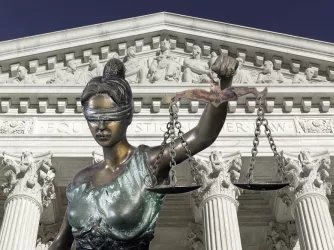Table of Contents
CFN Member Criticizes Brandeis for Charging Excessive Security
For FIRE friends, it's not too surprising that Brandeis University, one of only five schools on FIRE's Red Alert list, is flirting with another violation of students' rights. CFN member Daniel Ortner reported in The Brandeis Hoot on Friday that Brandeis is charging high security fees for bringing Bill Ayers and Robert H. King to campus. The event was scheduled for March 30, but postponed due to the prohibitively high costs until April 30. Ortner notes that FIRE has weighed in on similar measures involving the University of California at Berkeley and the University of Colorado at Boulder. The latter case involves the appearance of Bill Ayers with controversial professor Ward Churchill. Ortner writes:
[FIRE] argu[es] that excessive security fees are a form of prior restraint that unfairly burdens speech. This argument is amply backed up by Supreme Court precedent such as the Supreme Court's ruling in Forsyth County v. Nationalist Movement, 505 U.S. 123 (1992), which prohibits increasing a security fee because of a potentially hostile audience: "Listeners' reaction to speech is not a content-neutral basis for regulation.... Speech cannot be financially burdened, any more than it can be punished or banned, simply because it might offend a hostile mob." Thus, the university's actions can be seen us unduly punishing the expression of speech just because a large portion of students may respond critically.
"Charging for extra security because of a potentially hostile audience grants the most disruptive or violent hecklers a veto over controversial events and creates an incentive for that kind of behavior," Greg Lukianoff, FIRE's President, said. "It's also unconstitutional at a public college or university."
Ortner correctly notes that Brandeis is a private university and thus not held to the First Amendment. But it is held to its own policies, which forbid prior restraint:
Section 13 of the Rights and Responsibilities reads
"University facilities are available for activities consistent with the University's educational, social, and cultural goals. The University does not impose prior restraints upon the subject matter or point of view expressed by any person or group using its facilities."
Any effort by the university to impose prior restraint is a violation of the university's contract with its students, no matter the noble aims expressed.
The threat to free speech is clear: universities can simply charge more money for security than students can muster and thus shut down whatever speech they find controversial enough to need security. Ortner nails this point with his last paragraph:
What is obvious from these two examples is that a decent case can be made that our University is acting to suppress student speech by prohibitively costing such an event. This action may violate our student rights and thus even be prosecutable in court. What's clear is that the principle at stake here is a vital one. We cannot allow the fear of protests to stop us from bringing speakers to campus and from being exposed to unique ideas and views.
Recent Articles
FIRE’s award-winning Newsdesk covers the free speech news you need to stay informed.

Supreme Court must halt unprecedented TikTok ban to allow review, FIRE argues in new brief to high court

Australia blocks social media for teens while UK mulls blasphemy ban

Media on the run: A sign of things to come in Trump times? — First Amendment News 451
